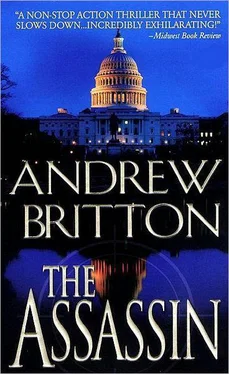Andrew Britton - The Assassin
Здесь есть возможность читать онлайн «Andrew Britton - The Assassin» весь текст электронной книги совершенно бесплатно (целиком полную версию без сокращений). В некоторых случаях можно слушать аудио, скачать через торрент в формате fb2 и присутствует краткое содержание. Жанр: Триллер, на английском языке. Описание произведения, (предисловие) а так же отзывы посетителей доступны на портале библиотеки ЛибКат.
- Название:The Assassin
- Автор:
- Жанр:
- Год:неизвестен
- ISBN:нет данных
- Рейтинг книги:3 / 5. Голосов: 1
-
Избранное:Добавить в избранное
- Отзывы:
-
Ваша оценка:
- 60
- 1
- 2
- 3
- 4
- 5
The Assassin: краткое содержание, описание и аннотация
Предлагаем к чтению аннотацию, описание, краткое содержание или предисловие (зависит от того, что написал сам автор книги «The Assassin»). Если вы не нашли необходимую информацию о книге — напишите в комментариях, мы постараемся отыскать её.
The Assassin — читать онлайн бесплатно полную книгу (весь текст) целиком
Ниже представлен текст книги, разбитый по страницам. Система сохранения места последней прочитанной страницы, позволяет с удобством читать онлайн бесплатно книгу «The Assassin», без необходимости каждый раз заново искать на чём Вы остановились. Поставьте закладку, и сможете в любой момент перейти на страницу, на которой закончили чтение.
Интервал:
Закладка:
“So he speaks Arabic and German. That should narrow it down.” Peterson cleared the screen and began typing in the new parameters.
CHAPTER 9
ALEPPO,LONDON
From across the crowded asphalt road, Erich Kohl watched as the young man finished his tea and left the coffee shop, walking north on Souq Khan al-Harir. Kohl returned the copper pot he’d been examining to a disappointed shopkeeper and followed at a leisurely pace, the cuffs of his loose cotton pants gathering fine dust from the street. It wasn’t difficult to trail the other man. Rashid al-Umari, he thought, still had a lot to learn about his new profession.
Kohl had arrived in the city two days earlier and had immediately taken up watch outside al-Umari’s small room south of the Citadel. It was countersurveillance, really; he knew exactly where the Iraqi was supposed to be, for he had been the one to formulate the travel plans, and the young man was not imaginative enough to deviate from his instructions. At least, that was what Kohl had thought until earlier in the afternoon, when al-Umari had walked out after three days in seclusion, blinking his eyes like an animal emerging from a long hibernation, and had set out to explore the city.
At the time, he’d been angered by the Iraqi’s inability to follow simple instructions. In retrospect, though, he could see that this was a positive turn of events. There were too many places around the hotel where security officers loyal to the West might have burrowed in. Had that been the case, even Kohl’s practiced eyes might not have been enough to pick them out of the crowd. With Rashid on the move, a watcher was forced to risk exposing himself, which put him at a distinct disadvantage. Fortunately, it did not appear to be a concern in this case; Kohl had been trailing the Iraqi for several hours now, and nothing seemed out of the ordinary.
On reaching the intersection, al-Umari turned right on Sharia al-Jamaa al-Umawi, passing the north entrance to the Great Mosque a moment later. Devout Muslims carrying their prayer rugs were already congregating on the hard-packed dirt of the parking area, smoking and engaging in idle conversation. As al-Umari made his way through the small crowd, Kohl dropped back, preparing to break contact. The younger man was clearly heading back to the Citadel, but…
Something was wrong. Kohl slowed his stride and tried to take in the larger scene. The crowd was building by the minute. The muezzins started up far overhead — not the muffled recordings found in so many Middle Eastern cities, but individual singers perched high in the minarets, the stone towers attached to the mosques. The day’s fourth call to prayer rippled over the city as the first singers were joined by hundreds more. With the mournful tones came the expected response; the crowd in the street continued to swell. His eyes passed over the scene: the wood-shuttered windows climbing above the pavement, the sand-stripped cars lining the curb, the faces sweeping past in the road. He was rifling his memory, searching for something, someone he had seen before. Nothing jumped out, but then he saw a dark head turning, tracking. He followed the gaze to al-Umari, who was just passing out of view, having found a shortcut through an alley framed by buildings of red stone. The man’s feet followed the gaze, stepping into the street, pushing through the throngs. There was something wrong with this dark, unlined face, Kohl thought. It was the face of a boy not yet twenty, too young for intelligence work. But those eyes were so intent, so focused…
Kohl considered quickly. There was nothing professional in the man’s movements, though that could be intentional; he had seen it done before. One watcher was given away to draw a response, to distract the target, but he didn’t think that was the case here. Syria’s internal security apparatus was an ever-shifting maze of poorly funded agencies with overlapping missions. The internal squabbles prevented any one organization from becoming too powerful, and none had the ability to develop competent field men. It was, Kohl suspected, the way Assad wanted things; by limiting his subordinates’ power, he robbed them of the authority they would need to displace him.
But there was something more. Through Kohl, al-Umari was tied in with the highest ranks of the Syrian government, and what he was prepared to fund would be greatly profitable to many people. These people, the parties of interest, would gain nothing by killing him.
Unless, of course, they were trying to cover their tracks, but it was too soon for that. They didn’t have the money yet, and besides, Kohl had been running countersurveillance for two days, during which time nothing had piqued his interest. Which left just one alternative: a simple robbery, the worst kind of luck.
The boy was across the street now, 10 meters in front of him, stepping into the alley. Even at this sharp angle, Kohl could see that the space between the buildings was too dark and narrow to attract a shopkeeper’s stand. Having lost sight of both men, he cursed under his breath and picked up the pace, brushing past a small group of bearded students before making the sharp right turn.
“Got something,” Peterson announced.
Naomi glanced up from the folder she’d been reading. “What’s that?”
“Nineteen-point match, ninety-five probability. It’s your guy, Kharmai.”
Naomi sat up in her chair abruptly. The file she’d been looking at slipped off her lap and scattered over the floor, but she was oblivious. “No way it’s a mistake?”
“Not unless you forgot to tell me something else,” was Peterson’s sardonic reply. “This one matches all over the board. There’s just one problem.”
The younger woman groaned. “Please tell me you have the clearance…”
“It’s not that. The background file was purged from the system.”
“What?” Naomi shook her head in confusion. “That doesn’t make any sense. Why would you still have the voiceprint if the record was deleted?”
“It happens more than you’d think,” Peterson confessed. “Remember, we intercept thousands of signals every week. We have a full-time staff whose only job is to compare the flagged intercepts with the records on file, but sometimes they make mistakes. It could be a clerical error. On the other hand, this record might have been deleted on purpose. If a known subject dies of causes natural or otherwise, the record is manually removed to save space in the servers, leaving only a couple of key identifiers, such as race, nationality, and languages. We don’t usually bother with the voiceprints, because they’re so small by comparison.”
“So you’re saying this guy is dead?”
“It’s a possibility. I hate to let you down, but that’s the truth.”
Naomi sighed heavily. “I can’t believe this,” she said. “That recording was made less than three months ago.”
Liz Peterson looked at her sharply. “How do you know that?”
“Because al-Umari — the known voice on the tape, I mean — wasn’t… around when we found it.” Kharmai silently chastened herself for nearly slipping up there; Peterson couldn’t know where the tape was found. “There’s no way he could have recorded it sooner, Liz.”
Peterson thought about that for a second, then reached for the phone and punched in a number. Lifting the receiver to her ear, she turned to the younger woman and said, “You’re right; none of this makes sense. We add new files to the database all the time, but extraneous files are only removed twice a year, and the last update was four months ago. If you’re right about when this tape was made, he should still be in the system.”
“So who are you calling?”
“The records section. We might have a hard copy, but they’ll have to dig for it. I hope you have some time on your hands.”
Читать дальшеИнтервал:
Закладка:
Похожие книги на «The Assassin»
Представляем Вашему вниманию похожие книги на «The Assassin» списком для выбора. Мы отобрали схожую по названию и смыслу литературу в надежде предоставить читателям больше вариантов отыскать новые, интересные, ещё непрочитанные произведения.
Обсуждение, отзывы о книге «The Assassin» и просто собственные мнения читателей. Оставьте ваши комментарии, напишите, что Вы думаете о произведении, его смысле или главных героях. Укажите что конкретно понравилось, а что нет, и почему Вы так считаете.












